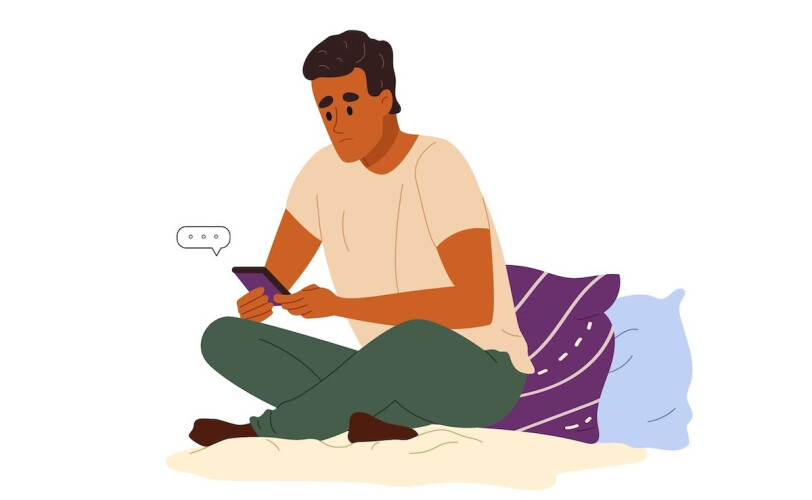Being ghosted by a friend means they suddenly cut off all contact without explanation—no returned texts, ignored calls, and radio silence where there was once closeness. Unlike the gradual drifting that naturally happens as life changes, ghosting is an abrupt, unexplained disappearance that leaves you confused, hurt, and questioning what went wrong. While ghosting is often associated with dating, like when someone disappears after a first date, friendship ghosting can feel even more painful because of the trust and history you’ve built together. If you’re struggling with this kind of sudden loss, learning how to get over being ghosted is the first step toward healing.
What Does It Mean to Be Ghosted by a Friend?
At its core, being ghosted by a friend is a form of social rejection where communication abruptly ceases without any explanation. One day you’re sharing inside jokes, and the next, your messages are met with silence. It’s not just about a delayed reply; it’s a consistent pattern of avoidance. You might notice they stop engaging with your social media posts, decline invitations without reason, or you hear from mutual friends that they’re avoiding you. This sudden withdrawal leaves you in a state of emotional limbo, replaying conversations and wondering what you could have possibly done to cause the silence.

Ghosting vs. Drifting Apart: Understanding the Difference
It’s important to distinguish ghosting from the natural process of drifting apart. Life happens. People move, start new jobs, get married, or have kids. These changes can lead to friendships evolving, and communication might become less frequent.
- Drifting is gradual and often mutual. It’s a slow fade where both people get busy, and the intensity of the friendship lessens over time. There’s usually no ill will, and you might still check in on each other’s birthdays or holidays.
- Ghosting is sudden and one-sided. It’s a deliberate decision by one person to cut contact without a word. The attempts to connect come from your end, but they are met with a wall of silence. The lack of closure is what makes ghosting so uniquely painful.
Clear Signs You’ve Been Ghosted by a Friend
Sometimes a friend is just genuinely busy. But when a pattern emerges, it might be ghosting. Here are a few clear signs:
- Your Texts Go Unanswered: At first, their replies were slow. Now, your messages are consistently left on “read,” or worse, not even opened for weeks.
- They Cancel Plans Repeatedly: They always have an excuse for why they can’t make it, but they never suggest an alternative time to meet up.
- One-Word Replies: When they do respond, it’s with short, dismissive answers like “ok,” “lol,” or “cool.” The effort to engage in a real conversation is gone.
- They Avoid You in Social Settings: If you’re in the same group, you might notice them actively avoiding one-on-one interaction with you.
- You’ve Been Muted or Removed on Social Media: You realize you haven’t seen their stories in a while, or you discover you’ve been unfriended or blocked.
- The Effort is Completely One-Sided: You’re the only one initiating contact, making plans, and asking questions. A friendship is a two-way street, and right now, you’re stuck in a dead end.
Why Do Friends Ghost Each Other?
Understanding the “why” isn’t about excusing the behavior, but it can help release some of the self-blame you might be feeling. Ghosting is almost always about the ghoster’s own issues, not your worth.

Fear of Confrontation and Conflict Avoidance
Many people simply haven’t developed the emotional tools for difficult conversations. They fear hurting your feelings, your potential reaction, or the awkwardness of a “friendship breakup” talk. Instead of facing a few moments of discomfort, they choose the path of avoidance, not realizing that the resulting silence is often far more damaging. This is a classic sign of conflict avoidance.
Unspoken Resentment and Unresolved Issues
Sometimes, friendships erode from small, unaddressed issues. Maybe they felt you weren’t there for them during a tough time, or perhaps they felt a growing sense of being taken for granted. Instead of communicating these feelings, they let resentment build until it feels easier to just disappear. They might even think you should know what you did wrong, using ghosting as a form of silent punishment.
Life Changes and Shifting Priorities
Major life transitions can completely reorder someone’s priorities. A new relationship, a demanding job, or a personal struggle with mental health can consume all their energy. While a true friend would ideally communicate that they need space, some people become so overwhelmed that they shut down and withdraw from everyone, including friends they care about.
Feeling Inferior or Competitive Dynamics
Sadly, jealousy and comparison can creep into friendships. If your friend is struggling with their own self-esteem, your successes might feel like a spotlight on their perceived failures. Instead of being happy for you, they feel inadequate. Ghosting becomes a way for them to escape those uncomfortable feelings of comparison without having to admit to them.
Protection from Toxic or Draining Situations
In some cases, ghosting can be an act of self-preservation. If a friendship has become toxic, manipulative, or emotionally draining, and previous attempts to set boundaries have failed, cutting contact might feel like the only way to protect their mental health. While it’s still a painful way to end things, this is one of the few instances where ghosting can be a necessary last resort.
The Emotional Impact of Being Ghosted
The pain of being ghosted by a friend is not just in your head; it’s a real and valid emotional wound. The sudden silence leaves you without closure, forcing your brain to cycle through endless questions. What did I do? Were we ever really friends?
This experience can trigger feelings of:
- Confusion and Self-Blame: You replay every last interaction, searching for a mistake you might have made.
- Worthlessness: The rejection can feel like a judgment on your entire character, making you question if you’re a good friend.
- Anxiety: It can create trust issues that bleed into your other relationships, making you fearful that other friends might abandon you too.
- Unresolved Grief: You’re mourning a loss without a funeral. There’s no official end, just an empty space where a friend used to be.
Should You Confront a Friend Who Ghosted You?
The urge to reach out for an explanation is completely natural. However, it’s important to manage your expectations.
Reaching out might be worth it if it was a long-term, significant friendship and the ghosting was very sudden and out of character. If you do, send one final message. Keep it simple, non-accusatory, and focused on your feelings.
For example: “Hey, I haven’t heard from you in a while and I’m feeling a bit confused and hurt. I value our friendship and I’m open to talking if you are. Either way, I wish you the best.”
This message opens the door without demanding entry. But be prepared for silence. No response is a response. It’s telling you they are unable or unwilling to communicate. At that point, the kindest thing you can do for yourself is to let it go. Closure often has to come from within.

8 Practical Steps to Cope When You’ve Been Ghosted
Healing is a process, so be gentle with yourself. Here are some compassionate steps you can take to move forward.
1. Allow Yourself to Grieve the Loss
You lost someone important. It’s okay to be sad, angry, or confused. Don’t let anyone tell you it’s “just a friend.” Let yourself feel the emotions without judgment. Journaling about it or crying it out can be incredibly cathartic.
2. Stop Reaching Out and Seeking Responses
Each time you send a text into the void, you’re reopening the wound. Accepting that no response is their answer is a powerful step. Mute their number and archive the conversation. Give yourself the gift of not waiting for a notification that isn’t coming.
3. Avoid Social Media Stalking
Constantly checking their social media to see if they’re happy without you is a form of self-torture. It will only feed your insecurities. Mute, unfollow, or even block them for a while. This isn’t about being dramatic; it’s about creating a safe space for you to heal.
4. Reflect Without Excessive Self-Blame
Take a moment for gentle reflection. Was the friendship truly balanced? Were there red flags you ignored? This isn’t about blaming yourself, but about learning. Even if you made a mistake, a healthy friendship involves communication and forgiveness, not disappearing. Ghosting is a reflection of their communication skills, not your worth.
5. Practice Self-Compassion and Reframe the Experience
Talk to yourself the way you would talk to a friend going through this. Say, “This hurts so much, and it’s okay that it hurts.” Reframe the ghosting not as “I was rejected,” but as “This person was not capable of having a healthy, communicative friendship with me.”
6. Lean on Your Support System
Talk to other friends or family members who you trust. Let them remind you that you are loved and valued. Hearing someone say, “That was a terrible thing for them to do, and you didn’t deserve it” can be incredibly validating.
7. Set Firm Boundaries for Future Interactions
Be prepared for the possibility that the ghoster might reappear months or even years later. It’s surprisingly common to wonder why ghosters always come back. Before you even think about letting them back in, decide what your boundaries are. A genuine apology and changed behavior are non-negotiable.
8. Focus on Building and Nurturing Other Relationships
Redirect the energy you were putting into the lost friendship toward the people who are present in your life. Invest in the friends who show up, communicate, and make you feel secure. This experience can be a powerful filter, helping you appreciate and cultivate healthier, more reciprocal relationships.
How to Rebuild Trust in Future Friendships
Being ghosted can leave deep scars, making you hesitant to be vulnerable again. Rebuilding trust is a slow process.

- Start small. Don’t feel pressured to share your deepest secrets with new friends right away. Let trust build organically over time as you observe their consistency and reliability.
- Communicate your needs. It’s okay to tell a new friend, “Hey, I really value open communication in my friendships.”
- Remember that this one person’s actions don’t define everyone. There are still loyal, communicative, and wonderful people out there who are capable of being a great friend to you.
Carry the lessons forward, but leave the pain behind. You deserve friends who communicate, who respect you, and who show up. And as you move forward, you’ll find them. For more thoughts on wellness and building healthy relationships, feel free to explore more on www.notonetype.org.


Có thể bạn quan tâm
How to Be a Better Wife: Practical Ways to Strengthen Your Marriage
Being a wife is a role that evolves. Some days it feels natural, and other...
Dec
Essential Advice for Building a Strong, Lasting Relationship
Building a relationship that lasts takes more than just love—it requires consistent effort, open communication,...
Dec
How to Deal with an Angry Partner: Effective Strategies for a Healthier Relationship
Dealing with a partner who frequently expresses anger can feel overwhelming. It’s emotionally draining. Whether...
Dec
How to Deal with Relationship Stress: 7 Proven Ways
Relationship stress affects nearly every couple at some point, causing tension, communication breakdowns, and emotional...
Dec
How to Rebuild Trust in a Relationship: A Step-by-Step Guide
Rebuilding trust after it’s been broken can feel like trying to glue a shattered vase...
Dec
How to Fix a Broken Marriage: 12 Proven Steps to Reconnect
Fixing a broken marriage is possible when both partners commit to the process, even when...
Dec